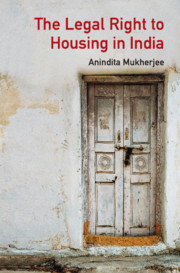Book contents
- Frontmatter
- Dedication
- Epigraph
- Contents
- Foreword
- Acknowledgements
- List of Abbreviations
- List of Cases
- List of Statutes
- Introduction
- 1 The Act of Definition
- 2 The Indian State in Response to Housing Claims
- 3 Mapping the Legal Environment
- Conclusions
- Annexure 1 Central Housing Law and Policy
- Annexure 2 National Campaign for Housing Rights
- Annexure 3 The National Right to Homestead Bill, 2013
- References
- Index
Annexure 2 - National Campaign for Housing Rights
Published online by Cambridge University Press: 26 April 2019
- Frontmatter
- Dedication
- Epigraph
- Contents
- Foreword
- Acknowledgements
- List of Abbreviations
- List of Cases
- List of Statutes
- Introduction
- 1 The Act of Definition
- 2 The Indian State in Response to Housing Claims
- 3 Mapping the Legal Environment
- Conclusions
- Annexure 1 Central Housing Law and Policy
- Annexure 2 National Campaign for Housing Rights
- Annexure 3 The National Right to Homestead Bill, 2013
- References
- Index
Summary
Evolution and Drafting of the ‘Housing Rights Bill’
The National Campaign for Housing Rights (NCHR) is an independent coalition of organisations and individuals from several States in the country. The Campaign believes that housing is a basic right for all—a secure place to live in peace and dignity and this right must be declared a Fundamental Right and campaigning for:
(a) the right to housing to be declared as a Fundamental Right,
(b) a comprehensive Peoples’ Bill of Housing Rights.
For the NCHR the very process of drafting the Bill is as important as the substantive part of the Bill itself. At the formative meetings in 1986 it was decided that it would be useful and necessary to first prepare and circulate as widely as possible a Draft Approach Paper—Towards a Peoples’ Bill of Housing Rights. For this purpose a ‘Housing and Law’ Working Group which came to be called the Legal Working Group was constituted by the NCHR in early 1987. This Approach Paper would be the basis on which a nation-wide awareness, discussion and solidarity was built up by inviting suggestions and issues from mass organisations, trade unions, activist groups, political parties, mass movements, voluntary organisations, professionals and other individuals and groups. This was conceived of as a process of popular democratic consultation and drafting of the Bill of Rights by the inadequately housed and homeless people themselves through their representative organisations.
The first Draft of this Approach Paper (DAP I, April 1987) was prepared by the Legal Working Group of the NCHR and published in April 1987. The DAP I was presented at the First National Consultation of the NCHR held at Bombay from 5-8 May, 1987. With the help of translations this preliminary document was widely discussed and the suggestions, issues, and amendments that emerged from these discussions were consolidated in a separate paper. Both these documents were circulated and discussed in several parts of the country through the NCHR Regional Campaign Centres, and the Campaign Secretariat. The Legal Working Group at its meeting in June 1987 consolidated and integrated the views emerging from the NCHR Consultation with DAP I.
- Type
- Chapter
- Information
- The Legal Right to Housing in India , pp. 153 - 197Publisher: Cambridge University PressPrint publication year: 2019



